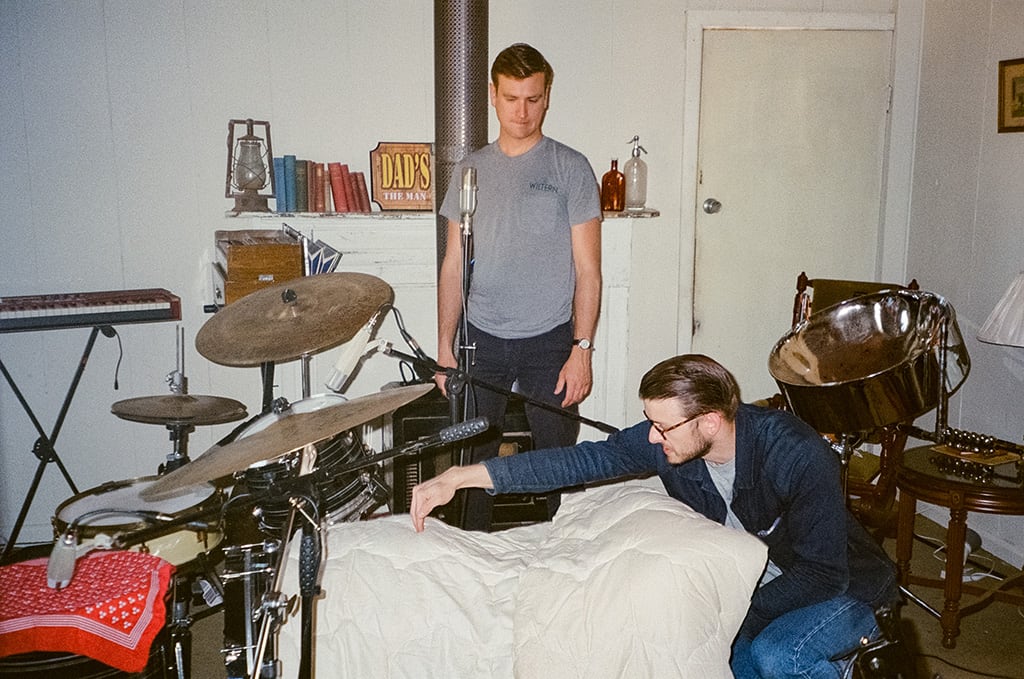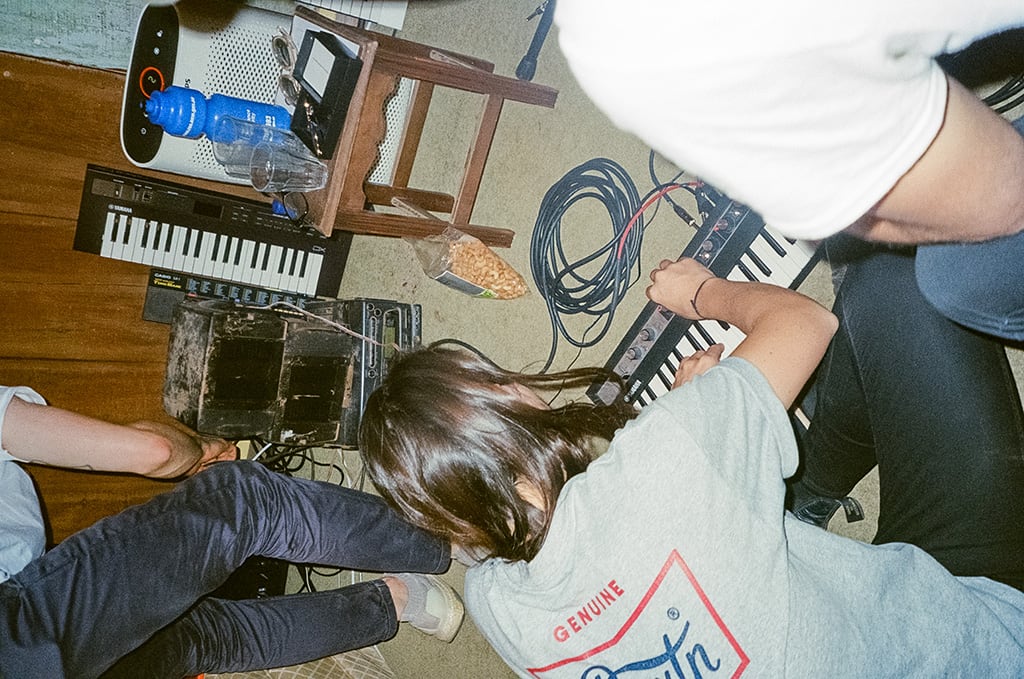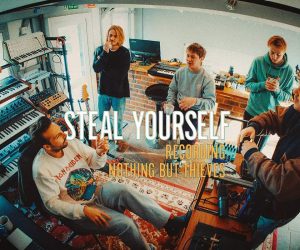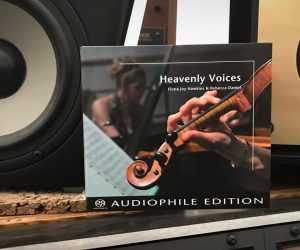
Down on the Farm: Recording Gordi’s Our Two Skins
Two US producers pack up 13 Pelican cases and record a deeply personal album in an abandoned cottage at Sophie Payton’s family farm. How did it go so right?

Album: Our Two Skins
Artist: Gordi
What’s it take to produce a world-class album from an old cottage on your family farm? Gordi’s latest, Our Two Skins, was produced from Sophie Payton’s (aka Gordi) farm in rural NSW. The ‘studio’ was an old, uninhabited cottage out the back, which needed some serious patch-up work by Sophie’s Dad. The production team was Chris Messina and Zach Hanson, who had almost literally just walked off the Bon Iver, I,I project. Chris and Zach filled 13 Pelican cases with mics, outboard, and noise making pedals and machines and crossed the Pacific to do the album.
“I first met Zach while touring with an artist, Tallest Man on Earth,” recalls Sophie. “I was opening the shows in Australia. Zach then helped me pull together my first album in 2017, which had the artist Sean Carey guesting on vocals for one song. That resulted in me touring with Sean and spending a couple of months, on and off, in 2018 in a tour bus with Zach and Chris, who was mixing front of house.
“I spent that time writing songs and bringing demos together. Chris and Zach were keen to involved in the making of my next album. I thought that would involve going to Au Clair where Zach and Chris have a studio in Wisconsin. But the studio was to be redeveloped.
“To cut a long story short I pitched them (and my mum and dad) the idea of recording the album in the old cottage on our family farm in Canowindra.”
(above) Zach Hanson and Chris Messina caught in the act of producing a record in a rundown cottage on Sophie Payton’s family farm.
THE COTTAGE
A ‘country cottage’ has a ring of romance about it but the cottage in question hadn’t been inhabited for years, was leaky and had dodgy power.
Zach: We showed up and saw it. We were pretty excited: ‘This is gonna be awesome. It’s going to be extremely unique.’
AT: You made the decision to relocate a lot of your studio gear?
Chris: That’s right. 13 Pelican road cases that actually got lost somewhere between Wisconsin and California on their way to Australia. That was a stressful 24 hours.
I suppose we probably could have called in more favours locally. But with our studio under construction, we had mountains of gear laying in storage. This is gear that Zach and I are really familiar with. Some stuff isn’t so easy to freight. For example, we locally sourced a pair of ATC SCM25A and Avantone CLA10s monitors.
Sophie: Turramurra Music were the knights in shining armour!
Zach: It was about trying to bring a lot of things with us that are interesting, but also multifunctional.
Chris and Zach filled 13 pelican cases with mics, outboard, and noise making pedals and machines and crossed the Pacific to do the album

ISOLATION
AT: Did the isolation of the project work for you — you couldn’t just run down to the shops or call in a session muso? And did it shape the sound of the record?
Sophie: I think it was really cool to be in a space that totally informed how everything sounded. The sound of the drums in the room, or the sound of the vocals in the next door kitchen with the lino floor… it all fed into how it sounds.
Zach: Working within limitations forces you to be creative. If you reach the limit of your creativity then you have to do something. Like the stereo in the shearing shed. Or, ‘let’s take a mallet and hit it on the chimney of the fireplace’. And then it becomes a huge percussion part in the chorus of Unready… things like that. It really comes out of being limited to what you have at your disposal.

USING THE ROOM
AT: Sounds like you did more than accept the constraints of the cottage… but you started to feed off it!
Chris: I think so. We certainly didn’t use all the noise making gadgets we brought with us. I’m not sure that that was a conscious effort. But thinking back about ideas, we used the cottage a lot.
We were using weird compression techniques to draw something out of the room, or to really screw with the compressor and make it do something out of the ordinary. All the drums on Volcanic, Zach was playing and we got a cool sound going with a Sony C37 mic placed just over to the front end of the kick drum — kind of like a knee position. And I was just messing with the Compex settings in real time on the take. That’s how you get that kind of sucking sound that’s happening with all the rim clicks. It’s just an example of finding something creative with what we had, rather than wishing we had something that wasn’t to hand.

COMPROMISES
AT: But there’s a reason why people record in commercial recording studios…
Chris: Right. And this cottage was no recording studio! When we were tracking something, I could almost see Zach playing drums through the gaps in the wall. So acoustic isolation wasn’t a thing.
Zach: But even in recording studios, with amazing live rooms and vocal booths, how many vocals are simply recorded in the control room in front of the speakers?
Chris: We didn’t have the best sounding control room. It wasn’t the most comfortable. But like, who cares? We were having a blast.
Zach: Then when we went to a studio to finish up the album, honestly, what we had done in the cottage translated just fine.
Chris: Right. It wasn’t like we got in the studio and we’re like, ‘Oh my God. What have we done?!’
Zach: I think we definitely got lucky. In hindsight, it was risky but we captured it in a usable fashion. But we were way more focussed on capturing the energy and excitement.
Chris: I think we managed to trust our instincts and it helped that we knew our gear really well — we knew what to expect out of the equipment we had. A pair of Sony C38s for room mics… an AKG D12 for kick… Sennheiser 421s on the toms. No surprises there.
Zach: It’s gonna be okay.
we found an abandoned stereo in the shearing shed. It had a wasp nest in the speaker cone. The guys got it working and it made an awesome tearing sound

PIANO
AT: The family piano makes more than a few appearances on the album. What’s the story there, Sophie?
Sophie: My Dad gave it to my Mum for her 30th birthday. I learnt on it. Over time I figured out it was never totally in tune. I might be in tune with itself but at one time the whole piano was a semitone out. Now it’s like a quarter tone out, which is actually way more inconvenient. I would record the piano then pitch in Ableton. Doing that actually gives it sort of warping, skipping sound, which I really, really love.
That sound was quite essential to Extraordinary Life and Aeroplane Bathroom. The piano you hear on Volcanic and Radiator, I actually recorded in Berlin and then put it through the Fostex reel-to-reel to give it a quality. For Look Like You I play Mum’s piano and sing, so that whole song is a quarter tone out.
The other big influence on this album is a tiny Casio Tone Bank. It was always in the house. It must be 30 years old and it’s my Mum’s — she’s kept it for her grandkids. Anyway, I dug it out and it ended up making the cut on just about every single song.
VOCALS
AT: Can you talk us through your vocal signal path?
Chris: We started off by using the C37 through a Shelford Channel. But the setup wasn’t making Sophie feel very comfortable so we asked her how she normally records her vocals.
Sophie: I was like: I just sit at my desk and hold an SM7 and sing into it after press record on my laptop. So most of the vocals were recorded that way.
Probably my favourite vocal recording moment was for Unready. I just wasn’t nailing it. We took a break, and the guys suggested we switch things up and go to the main house, and see if we can get the take there.
My family has lived at the farm for 150 years, so the running joke was no matter how obscure, we always seemed to have any random object you could think of. Chris asked: ‘I don’t suppose you guys have a strobe light?’ ‘You know what? I think we do.’ I went to my brother’s room and dug one out and we turned the lights off and Chris’s job was to man the strobe light.
Zach: Very important job: Vibe Tech.
AT: What about vocal processing in the mix?
Zach: From memory we put the UAD 1081 on Sophie’s vocal channel for a little top-end boost and some mid range control. After that I we would have used the Fairchild’s 670 to grab a little more. We did some compression on the way in but I want to say we did some in the mix and some de-essing with FabFilter’s Pro De-Esser.
Chris: We were dabbling with OEKsound Soothe [dynamic resonance suppressor] at the time. Which rules.
Zach: A fantastic plug in. And any of the FabFilter stuff is definitely showing up. Even on that lead vocal channel a Pro Q2 would be there to notch some harsh frequencies. Super easy plug-in. User friendly. Appealing to look at also.

FINAL REFLECTIONS
AT: How do you look back on the project, Sophie? Would you do it again?
Sophie: It was like, literally, the best time of my life. The night before we started I was like a kid at Christmas — magical, unabashed excitement. I could hardly sleep I was so excited. And it was awesome. I think I’m scared to make another record because I don’t know how it could match the experience.
The fact that the guys came down; saw where I’m from; spent so much time with my parents… it was awesome experience. I mean, I’m glad the record sounds as good as it does… but to be honest, even if it didn’t, it wouldn’t diminish the experience.
AT: That’s quite the testimonial! Chris, Zach… how do you respond to that?!
Chris: It’d be hard to jump into a situation like this with just anybody. The three of us are lucky enough to work well together and know each other in the way we do.
Zach: To have these two dudes come and live with your family. there’s a level of trust there.
I was feeling a little pressure early on — ‘we got to produce a sweet record. How are we going to pull this off?’
Have a listen to Our Two Skins. I don’t think Zach has anything to worry about.
I was just messing with the Compex settings in real time on the take. That's how you get that kind of sucking sound that's happening with all the rim clicks

















RESPONSES